I had a sinus infection, and my life felt a lot like Sandy’s from SpongeBob SquarePants. It was as if I were carrying a heavy space helmet with little oxygen.
I had to cope with that feeling for two years and, like everyone else, I tried pretty much everything.
From steam inhalation with essential oils to nasal irrigation with a neti pot and using humidifiers, I tried it all to support my healing journey.
However, if there’s one pivotal point that truly changed my life, it was discovering sinus tea.
It all happened in my grandma’s kitchen counter where we’ve tried tons of home remedies and herbal teas that ended up being my key to healing.
In this article, I will help you make the BEST tea for sinus infection yourself.
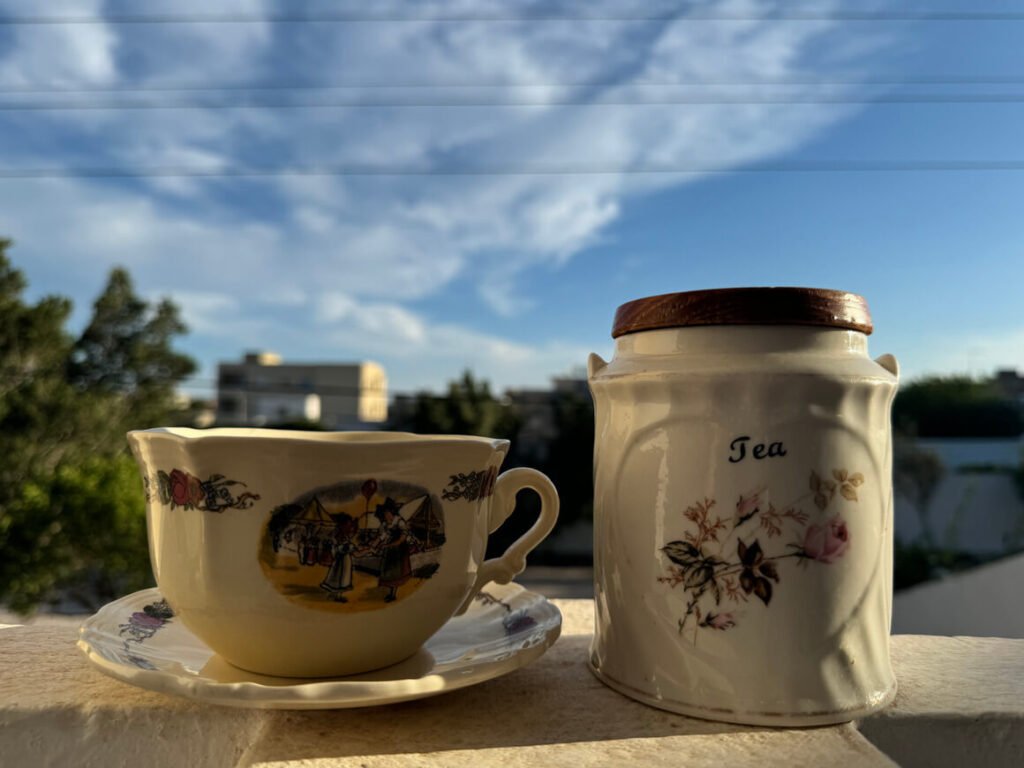
Image: oumaima.haded
Are Herbal Teas Good for Sinus Infections?
While individual responses may vary, many sinus infection patients on forums and social media platforms report the almost magical health benefits of sinus teas. And I wholeheartedly agree.
Here’s why.
They Hydrate
Nasal congestion reduces airflow within nasal passages, which causes poor oxygen supply to the brain.
Drinking much fluids, such as water and tea, improves oxygenation and clears nasal passages and you’ll be able to breathe easier.
I like bringing my cup of tea close to my nose and inhaling the vapor—it’s a moment of relief in itself.
Have Anti-inflammatory Properties
Sinus infection typically involves the inflammation of the sinuses.
During my sinus infection healing journey, I used to experiment with many herbs and spices that particularly have anti-inflammatory properties.
So many natural ingredients like turmeric, cinnamon, ginger, thyme, and chamomile are scientifically proven to fight sinus inflammation and alleviate nasal congestion.
Have Decongestion Properties
These ingredients are natural decongestants:
- Eucalyptus
- Peppermint
- Ginger
I started adding these three ingredients to my homemade tea and I noticed a significant improvement in my sinus congestion and overall comfort.
They Soothe Your Sinuses
During what I call my sinus infection battle, my main struggles were facial pressure and a stuffed-up nose. (Sound familiar?)
I was feeling like there’s a constant build-up of mucus in my throat and my nose is so dry that it hurts. Turning to chamomile and lemon balm tea became a soothing ritual that helped ease these symptoms.
In fact, natural teas offer a gentle and sustainable approach to finding relief. They help the body relax and alleviate sinus discomfort.
Support The Immune System
When talking of herbs and alternative medicine, herbalists sing the benefits of herbal teas in supporting the body’s immune system. You can consider teas as one of the best ways to get rid of sinus infection without antibiotics.
Jump straight to your kitchen and add these ingredients to your tea cup: green tea, ginger, and lemon balm.
Also, don’t hesitate to add that sweet tablespoon of honey for a good taste.
The Best Sinus Soother Tea
Now, what tea is good for sinus allergies?
This recipe was the most effective at treating my sinus infection and it will help you too.
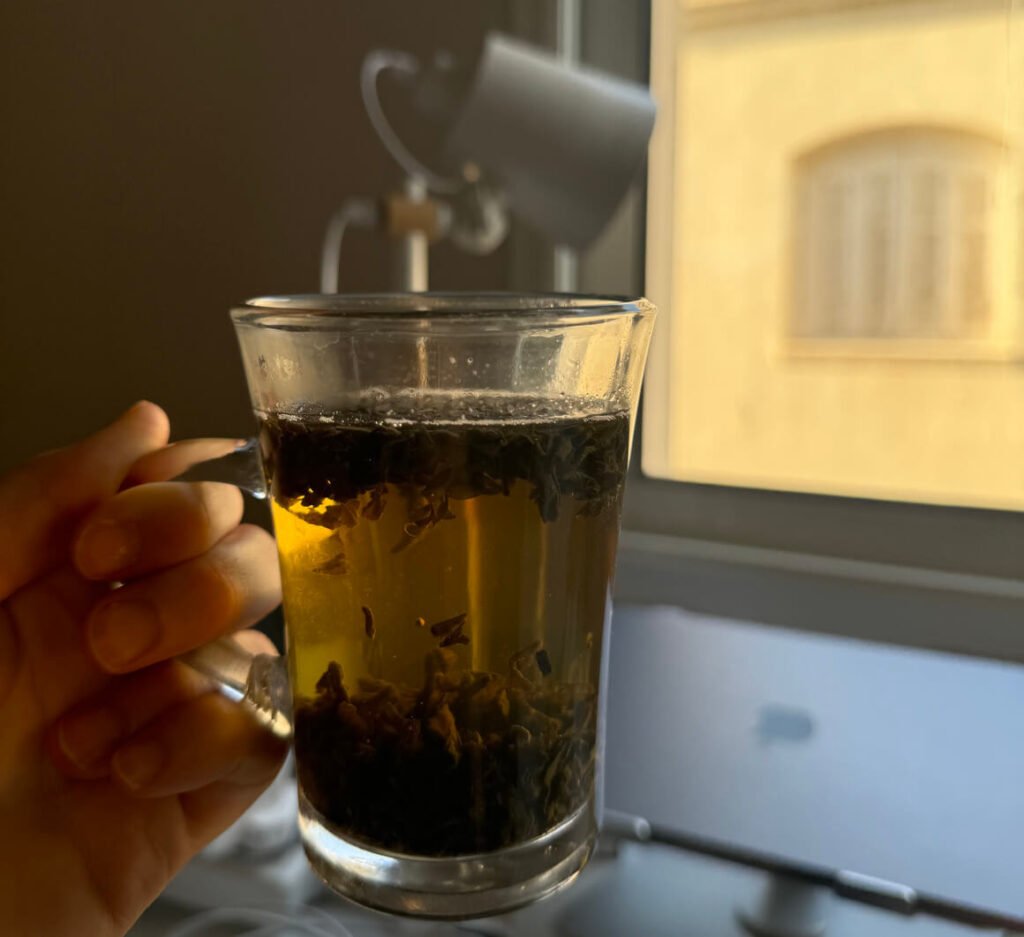
Image: oumaima.haded
Natural Ingredients
- 1 cup of warm water
- Fresh or dry Nettle leaves
- 1 tsp of green tea leaves or a green tea bag
- Mint
- A small slice of ginger
- 1 tsp of honey (optional, but who doesn’t like honey)
Recipe for Sinus Tea
- Bring 1 cup of water to a boil
- While the water is boiling, gather the nettle leaves, the green tea, some mint, and the ginger slice all in one cup.
- Once boiled, remove the water from the heat and directly add it to the mix.
- Cover the cup and let it sit for 5 minutes (Don’t skip this step, trust me!)
- Strain the herbal tea to remove all ingredients
- Sweeten if desired with a tsp of honey.
Other Sinus Relief Teas
Herbal teas are no secret to me. My grandma’s kitchen was my lab and I used to just gather herbs and spices based on a bit of scientific research and brew them into a cup of tea.
Creating the tea was as healing as drinking it. Researching the properties of natural ingredients, blending them together, and savoring that cup of tea made a significant difference in improving my condition.
Throughout my journey, I have discovered some of the best teas for allergies and sinuses. Here are my top picks.
Nettle Tea
Is nettle tea good for sinus infection?
A study revealed that stinging nettle is super effective
- A natural decongestant
- Has antimicrobial properties which support the immune system.
- Is an antihistamine that helps reduce sinus allergy (outsource)
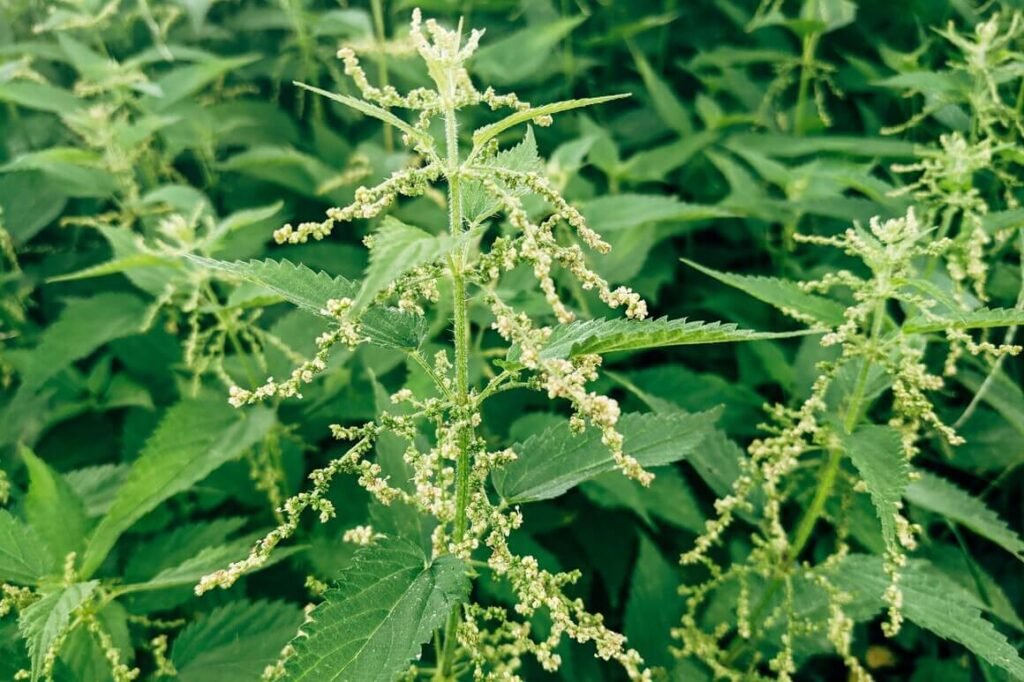
Here’s how nettle tea is done:
| Ingredients | Instructions |
|---|---|
| – 1 cup of warm water – Fresh or dried nettle leaves – Green tea – Cayenne pepper or black pepper to spice it up (optional) | 1. Bring the water to a boil. 2. Infuse fresh or dried nettle leaves and green tea in boiled water for 5 minutes. 3. Remove from the heat and strain. 4. Add the spice to reduce nasal congestion. |
Lemon and Ginger Tea
Ever experienced that zingy kick from biting into a spicy slice of ginger? When you drink ginger sinus tea, your organism gets a similar kick, activating its “support mode”.
Apart from its immune-boosting potential and sinus drainage, ginger has anti-inflammatory, antibacterial, and antiviral effects.
Add an extra slice of lemon, and you’ve got yourself a fantastic sinus-soothing tea—plus, my grandma swears by it! Let’s make it together.
| Ingredients | Instructions |
|---|---|
| – 1 cup of water – A peeled and sliced small piece of ginger – 1 slice of lemon or lemon juice – Honey (optional) | 1. Bring the water to a boil. 2. Add the ginger root and simmer for 5 minutes. 3. Remove from the heat and strain. 4. Add honey to taste (optional) |
Chamomile Tea
One of the greatest Research I’ve found proved that chamomile extract is effective at alleviating sinus-related symptoms and improving the quality of life of sinusitis patients.
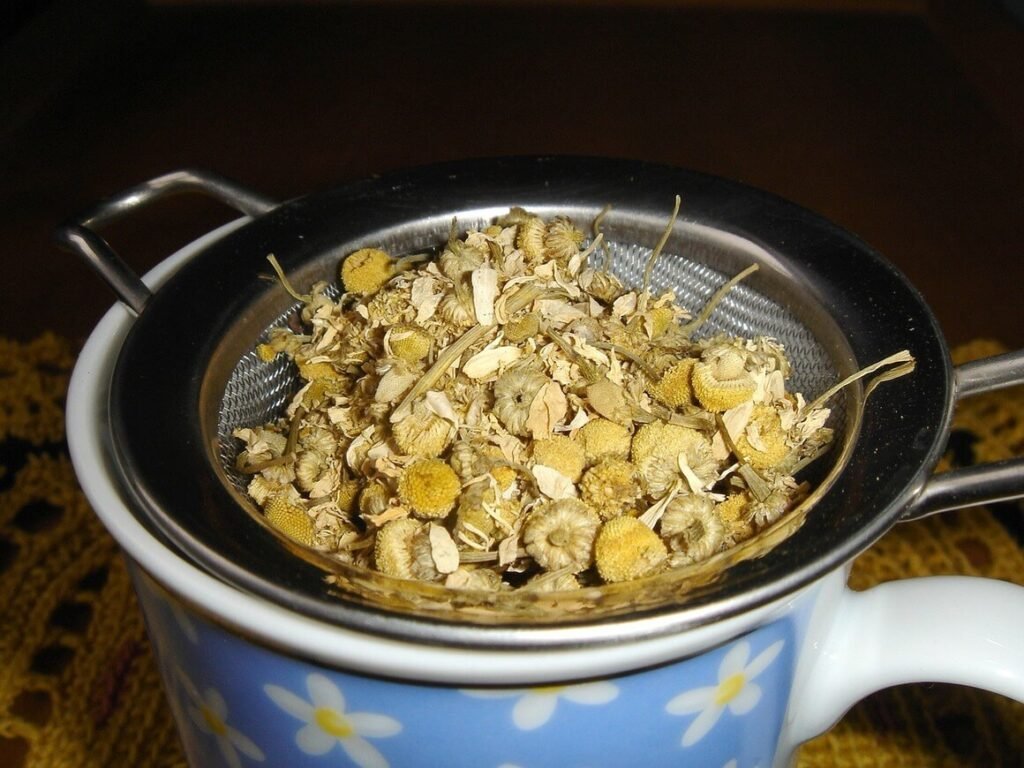
With that said, a chamomile tea cup contains an anti-inflammatory potential and soothing effect that your body craves, often without you realizing.
Here’s how you make it:
| Ingredients | Instructions |
|---|---|
| – 1 cup of hot water – 1 teaspoon dried chamomile flowers – 1 tsp of honey – A small slice of Ginger (optional) | 1. Bring the water to a boil. 2. Infuse the chamomile flowers 3. Cover the cup and let it sit for 10 minutes. 4. Add honey to taste (optional) |
Peppermint Tea
Have you ever heard of menthol? It’s an ingredient in peppermint known for its decongestant properties.
Your peppermint tea cup brings a nice pack of benefits including
- Open the nasal passages
- Reduce sinus inflammation
- Creates a refreshing sensation
Think of adding natural ingredients to boost the effectiveness of peppermint tea such as:
- Eucalyptus to strengthen the decongestion effect
- A sash of ground cinnamon to spice it up
- Turmeric for its anti-inflammatory potential
- A slice of ginger or lemon
- Honey for that smooth and soothing effect
| Ingredients | Instructions |
|---|---|
| – 1 cup of warm water – 15-20 fresh peppermint leaves, rinsed and patted dry – A pinch of turmeric powder (optional) – 1 tsp of honey (optional) | 1. Bring the water to a boil. 2. Remove the water from the heat and let it cool for 1-2 minutes. 3. Infuse the peppermint leaves. 4. Cover the cup and let the tea sit for 5-10 minutes, or until the desired strength is reached. 5. Strain the tea and enjoy |
Tips for Making and Drinking Sinus Tea
- Use fresh, high-quality ingredients to optimize flavor and therapeutic properties
- Always pair your tea with honey or lemon to boost the homemade tea’s soothing potential
- Cover the cup while infusing and follow steeping time instructions to ensure the right taste and effect.
- Inhale the natural tea steam to open your nasal passages.
- Sip your tea slowly while it’s still warm to allow the fresh aroma to cool your senses.
- Don’t be afraid of trying different homemade tea blends to find what works best for you. That’s quite literally how I healed!
- Make your tea ritual and cherish the moment.
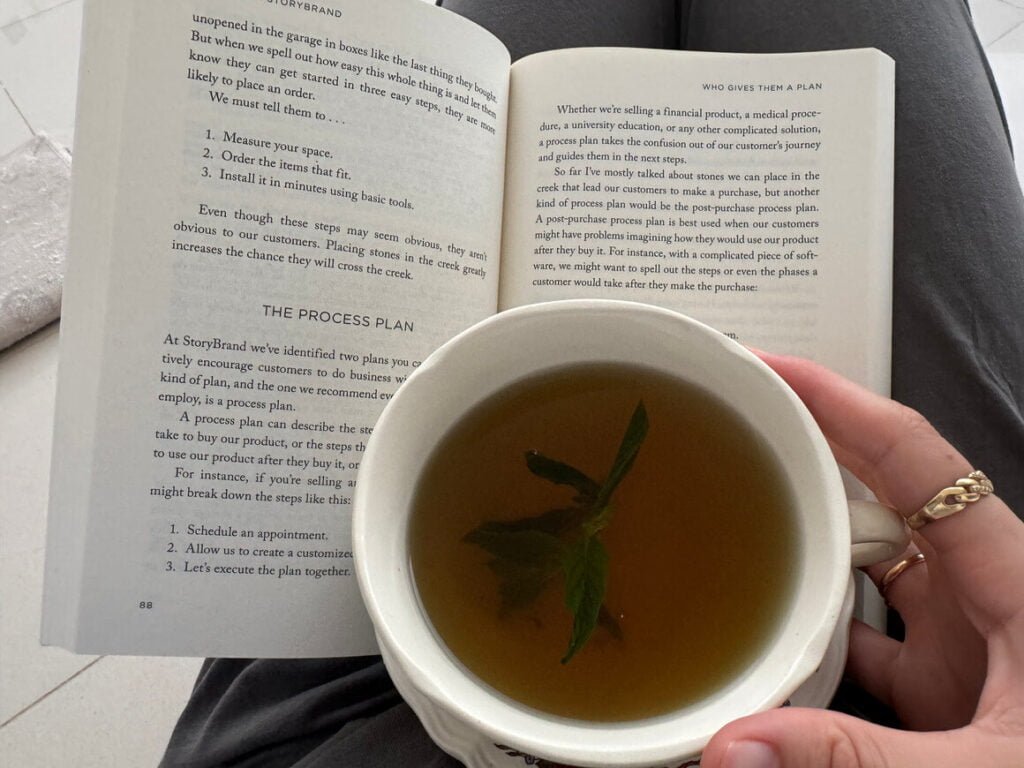
Image: oumaima.haded
Incorporating Sinus Tea Into Your Routine
Healing your sinus infection naturally is a process that requires discipline, consistency, and so much positivity. Trust me on that!
When I believed that healthy practices and holistic treatment for sinus infection were part of healing, my condition improved significantly. And sinus tea is definitely an effective addition to your daily routine.
The secret is to romanticize your tea rituals.
- Find a convenient time to sip your tea and make it regular.
- Make it a self-care moment: take deep inhales, add a splash of lime and honey to cool down, and allow yourself to relax as you sip.
- Pay attention to how your body responds to sinus tea, and always seek medical guidance and advice when needed.
Conclusion
Among all the natural remedies I’ve tried, I found sinus soother tea to be exceptionally beneficial.
My advice to you is to never underestimate the potency of sinus tea in enhancing your well-being.
Since it’s a natural remedy, results may take time to manifest, emphasizing the importance of perseverance and consistency for optimal healing.

Image: oumaima.haded
Read More
- Relieving Sinus Pressure: My Journey with Chamomile Tea
- How I Used Tea Tree Oil For My Sinus Infection
- How I Treated My Sinusitis with Oregano Oil: Everything You Should Know
- My Healing Journey from Sinusitis | What I did to Transform My Life
- Can Stress Cause a Sinus Infection?
Disclaimer – Knowlege Is Power: This content provides generic information only. It is in no way a substitute for a qualified medical opinion. Always consult a specialist or your own doctor for more information. We do not claim responsibility for this information.


Leave a Reply